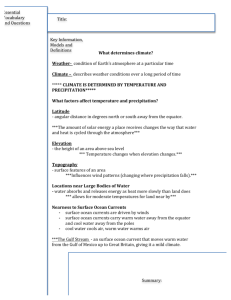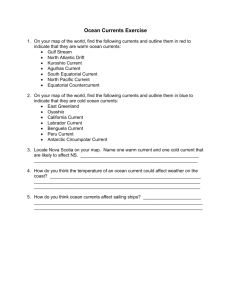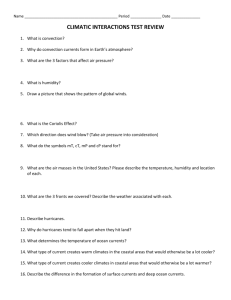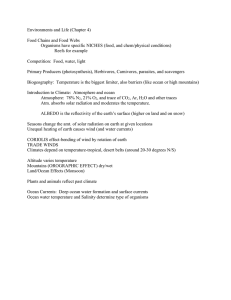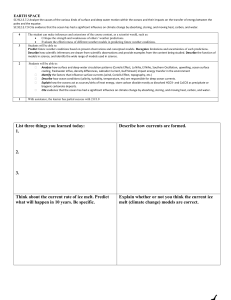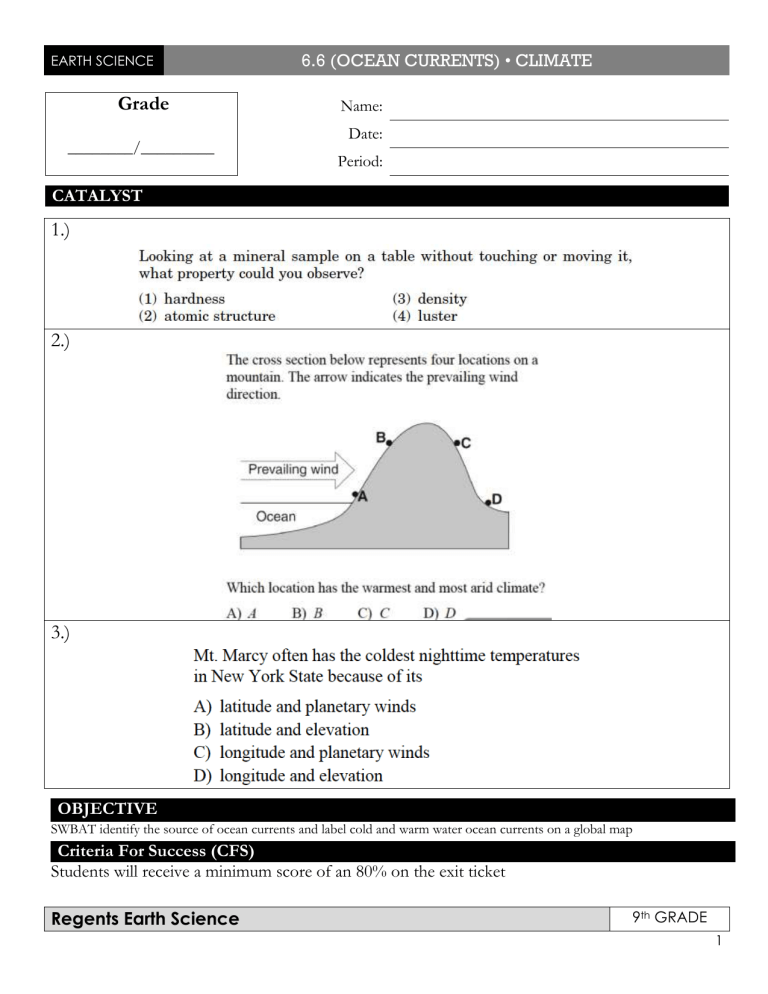
EARTH SCIENCE Grade ________/_________ 6.6 (OCEAN CURRENTS) • CLIMATE Name: Date: Period: CATALYST 1.) 2.) 3.) OBJECTIVE SWBAT identify the source of ocean currents and label cold and warm water ocean currents on a global map Criteria For Success (CFS) Students will receive a minimum score of an 80% on the exit ticket Regents Earth Science 9th GRADE 1 EARTH SCIENCE 6.6 (OCEAN CURRENTS) • CLIMATE The above picture is taken from a street in England. This location has a latitude of 51.5 North, yet palm trees are usually known to grow only in very warm climates. How is this possible? Regents Earth Science 9th GRADE 2 6.6 (OCEAN CURRENTS) • CLIMATE EARTH SCIENCE Reading – Ocean Currents: Surface temperatures vary considerably with latitude: warmer near the equator and colder near the poles. The sinking of cold water at the poles must be balanced by upwelling that brings deep water back to the surface. Cold water can hold more oxygen and support more marine life than warm water. For this reason, upwelling, cold currents commonly bring nutrients to the surface in some of the world’s best fishing grounds. The circulation of surface water follows the prevailing winds. Both are affected by Earth’s rotation. Winds and ocean currents generally curve as they travel long distances over Earth’s surface. This curvature is called the Coriolis effect. Actually, the winds and ocean currents are going as straight as they can, but Earth’s rotation makes them appear to curve to the right in the Northern Hemisphere and to the left in the Southern Hemisphere. CFU: What causes ocean currents? How do they form? ____________________________________________________________________________ ____________________________________________________________________________ Your ESRT has a map of the world showing the most common surface current directions. Notice that most of the currents in the North Atlantic follow a circular path curving constantly to the right in a great clockwise circle. The currents in the northern part of the Pacific Ocean also follow this clockwise (to the right) pattern. Currents in the South Atlantic and southern parts of the Pacific Ocean curve to the left in a counterclockwise pattern. Currents and Climate: Ocean currents influence the climates of coastal locations. The temperature of ocean water does not change as quickly as the temperature of rock and soil. Therefore, coastal locations usually have a smaller range of temperature than do inland locations. Cold and warm currents also affect coastal temperatures. For example, people who live along the coast of California are not as likely to swim in the ocean as people who live along the Gulf of Mexico or the Atlantic coastline of the United States. Cold ocean currents along the California coast keep the water temperature too chilly for most swimmers, even in the summer. The cool ocean water also prevents summer temperatures from getting too hot along the coast of southern California. CFU: Why do coastal areas have smaller temperature ranges than inland locations? Regents Earth Science 9th GRADE 3 EARTH SCIENCE 6.6 (OCEAN CURRENTS) • CLIMATE ____________________________________________________________________________ ____________________________________________________________________________ ____________________________________________________________________________ The climate along the southern coast of Alaska is moderated by relatively warm ocean water. Summer and winter temperatures are relatively mild in this part of Alaska. Palm trees grow in some areas along the west coast of Great Britain where the warm currents of the Gulf Stream and the North Atlantic Current moderate winter temperatures. These coastal locations have winters far less severe than central European cities that are far from the ocean. By looking at the arrows on Your ESRT can tell you where warm or cool ocean currents affect coastal areas. The black arrows show warm currents and the white arrows show cool currents. CFU: What latitudes do warm ocean currents originate from? Cool ocean currents? ____________________________________________________________________________ ____________________________________________________________________________ Regents Earth Science 9th GRADE 4 6.6 (OCEAN CURRENTS) • CLIMATE EARTH SCIENCE Climate Graph: New York City, New York Climate Graph: San Francisco, California Regents Earth Science 9th GRADE 5 EARTH SCIENCE 6.6 (OCEAN CURRENTS) • CLIMATE What do you notice about the difference in temperature between San Francisco and New York? ____________________________________________________________________________ ____________________________________________________________________________ Why do you think NYC gets hotter in the summer, while San Francisco stays relatively cool? (Note: They are both near bodies of water) ____________________________________________________________________________ ____________________________________________________________________________ Fill in the appropriate blanks here: Generally, areas close to large bodies of water will have _________________ summers and _________________ winters than their corresponding inland locations at the same latitude and elevation. This is due to water’s ________ specific heat. What causes ocean currents to form? ____________________________________________________________________________ ____________________________________________________________________________ Regents Earth Science 9th GRADE 6 EARTH SCIENCE 6.6 (OCEAN CURRENTS) • CLIMATE Question(s): 1.) 2.) 3.) 4.) Regents Earth Science 9th GRADE 7 EARTH SCIENCE 6.6 (OCEAN CURRENTS) • CLIMATE 5.) 6.) Regents Earth Science 9th GRADE 8 EARTH SCIENCE 6.6 (OCEAN CURRENTS) • CLIMATE 7.) 8.) Regents Earth Science 9th GRADE 9 EARTH SCIENCE 6.6 (OCEAN CURRENTS) • CLIMATE 9.) 11.) 12.) Answer: _____________________________________________________________________ ____________________________________________________________________________ Regents Earth Science 9th GRADE 10 EARTH SCIENCE 6.6 (OCEAN CURRENTS) • CLIMATE Base your answers to questions 13-14 on the two images below. Map I shows Australia’s major landscape regions. Letters A through H represent locations in Australia. Map II shows Australia’s climate regions. 13.) 14.) Regents Earth Science 9th GRADE 11 EARTH SCIENCE Exit Ticket Grade _______/_______ 6.6 (OCEAN CURRENTS) • CLIMATE Name: Date: Cohort: Exit Ticket 1.) 2.) 3.) Regents Earth Science 9th GRADE 12 EARTH SCIENCE 6.6 (OCEAN CURRENTS) • CLIMATE 4.) Regents Earth Science 9th GRADE 13

